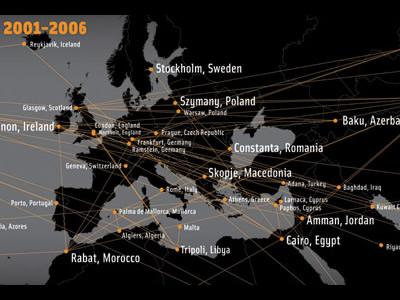
There has been a predictable welcome from both UK political sources and the media to calls from Lord Carlisle for an independent judicial probe into claims of British government complicity in rendition.
However, past results of United Kingdom judicial enquiries headed by so called 'eminent' judges hardly engender confidence (after all we have the recent experience of the Hutton enquiry). Cynics might suggest that having been caught out in relation to its duplicity over rendition the best thing that the Labour government could hope for is for an 'independent person' to call for such an enquiry.
In Lord Carlisle's case he, at first glance, is well placed to air such a demand publicly, having apparently excellent credentials as the governments terrorism 'watchdog'.
However Lord Carlisle's observations on rendition in the past have not been entirely condemnatory. In the FIRST REPORT OF THE INDEPENDENT REVIEWER PURSUANT TO SECTION 14(3) OF THE PREVENTION OF TERRORISM ACT 2005 he says:
"The general issue of rendition is all too easily over-simplified. Subject to an appropriate system of law and compliance with international obligations especially relating to national security, if appropriate by excluding foreign nationals who threaten that security".
In the same report he also said:
"It follows that I reject as naive and simplistic those over-deployed arguments to the effect that any country with a bad human rights record must be regarded as beyond the pale in perpetuity".
Carlisle has also come in for criticism over his response to submissions from NGOs. One such organisation, Scotland Against Criminalising Communities (SACC), went as far as to label Carlisle a 'spin-poodle' and accused him of promoting the governments agenda.
Commenting on Carlisle's review of the 'definition of terrorism' SACC said:
'We've seen this kind of consultation before. Lord Carlisle conducted a lengthy review of the definition of terrorism and published his findings in March this year. He invited contributions from civil liberties groups and communities. Many groups, including SACC, made substantial submissions to the review. But few of the submissions found their way into Lord Carlisle's report. It contains hardly a hint of the concerns expressed by many groups in their written submissions. And it doesn't mention the widespread opposition to the legislation Lord Carlisle encountered in consultation sessions held around the UK. It certainly doesn't reflect the views expressed at the Lord Carlisle held in Glasgow last July. Everyone attending the meeting - including police officers - was critical of the current legislation. Instead, Lord Carlisle concluded the definition of terrorism was - useful and broadly fit for purpose - '.
Also speaking about that review SACC speculated that "The Home Office appears to think that Lord Carlisle has kicked this debate into the long grass".
It would be unfortunate to say the least if, with the UK government once again on the hook over rendition, that anyone, least of all Lord Carlisle, tried to 'kick the debate into the long grass'.
What is needed is an investigation conducted under the auspices of the United Nations or Council of Europe not some gerrymandered enquiry by a UK judicial establishment figure - no matter how eminent.
Links to references cited in this article at:
J B Moffatt Director of Information Celtic League
01/03/09
 The Celtic League has branches in the six Celtic Countries. It works to promote cooperation between these countries and campaigns on a broad range of political, cultural and environmental matters. It highlights human rights abuse, monitors all military activity and focuses on socio-economic issues.
TEL (UK) 01624 877918
MOBILE (UK)07624 491609
(voir le site)
The Celtic League has branches in the six Celtic Countries. It works to promote cooperation between these countries and campaigns on a broad range of political, cultural and environmental matters. It highlights human rights abuse, monitors all military activity and focuses on socio-economic issues.
TEL (UK) 01624 877918
MOBILE (UK)07624 491609
(voir le site)